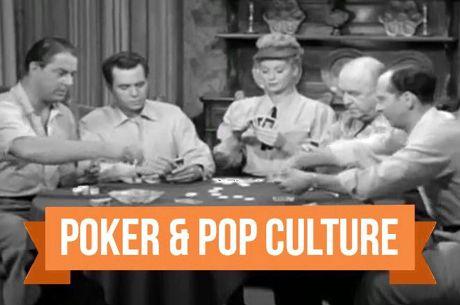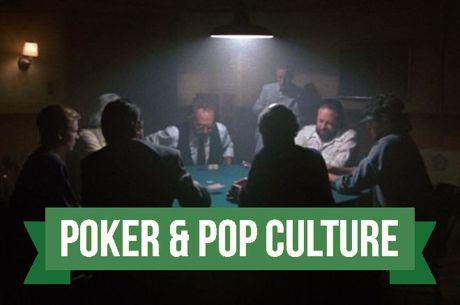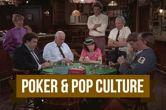Poker & Pop Culture: Games Among Co-Workers and Friends in TV Sitcoms
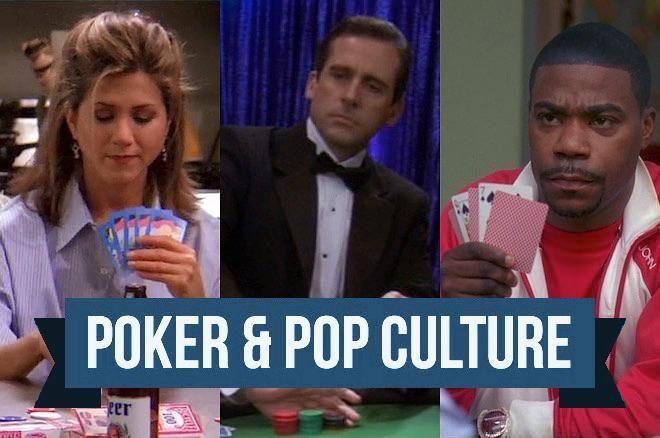
Finishing a short survey of television situation comedies that have used poker as a means to generate plots and humorous conflicts, let's look at a few more recent examples �� again, all coming from (ultimately) long-running TV series that used poker relatively early in their runs to help establish characters and dynamics between them.
A Game Among Friends
The sitcom Friends ultimately enjoyed a lengthy 10-season run from 1994 to 2004, although early on struggled in the ratings while trying to distinguish itself from other, more popular shows. The New York City-based show featured an ensemble cast of three men and three women, usually highlighting their romantic relationships either with those outside the group or with one another.
The very generic series name was matched by episode titles all following the same "The One with..." format, with an early episode from 1995 during Season 1 perhaps predictably being "The One with All the Poker." Of the more recent TV sitcoms involving poker, this example directly harkens back to older shows from the 1950s and 1960s discussed here before in which poker transparently enables a "battle of the sexes"-type story playing off the game's male-dominated historical legacy.
The show in fact opens with the men discussing their regular poker game and the women asking why they haven't been invited.
"What is it some kind of guy thing?" asks Phoebe (Lisa Kudrow). "We just don't happen to know any women that know how to play poker," answers Joey (Matt LeBlanc).
"That's a typical guy response," says Monica (Courtney Cox).

The men are more than willing to invite the women into the game, but they don't know how to play. The men have to teach them, then, and soon enough they play and the men win handily. The women recruit Monica's poker-playing aunt to give them further lessons, a rematch comes, and the men win again.
Finally a third game is arranged, and here the tide turns somewhat, at least for Rachel (Jennifer Aniston) who begins winning pots off of Ross (David Schwimmer).
Predictably the episode resolves in a huge heads-up pot between the pair �� predictable because already from the start of the first season viewers know that Ross has a longtime crush on Rachel and pines for her. The hand therefore becomes a way to illustrate that sentiment while also furthering the pair's relationship that soon in the series results in their becoming a couple.
The hand also challenges Ross's earlier proclamation �� also presented a "typical guy" remark �� that when it comes to poker "I play to win, and in order for me to win, other people have to lose.... Don't expect me to be a nice guy."
In a hand of five-card draw the pair put in a series of raises, with the others having to supply money on both sides to complete the final bets �� the women helping back Rachel, and the men backing Ross. Rachel tables a full house, and Ross mucks without showing his hand.
It's obvious, though, that Ross had her beat �� that he decided to be a "nice guy" and not play to win this time. It's another step in the romantic arc between the pair, and a further elaboration of each character for the viewer.
Bluffs, Tells, and a Break from The Office Routine
By the time the episode "Casino Night" appeared in May 2006 to conclude the second season of the American version of The Office, the cast of the workplace-based comedy had been fairly well introduced. Indeed, fans of the show remember the episode primarily for its culminating two seasons' worth of romantic tension between central characters Pam (Jenna Fischer) and Jim (John Krasinski).
In the episode the company converts the warehouse into a gambling hall for a charity "casino night," with a poker tournament among the games on offer. The boss Michael (Steve Carrel) goes all in on the first hand and gets called by his nemesis Toby, the human resourses representative, a hand that reaffirms both Michael's ineptitude and the pair's antagonism.
Afterwards Michael paraphrases Phil Hellmuth's infamous line �� "If luck weren't involved, I would always be winning."
Meanwhile Dwight (Rainn Wilson) thinks he knows Jim's tell (coughing when strong), but of course it's a reverse tell �� another example of Jim making a fool of Dwight. And the mysterious Creed (Creed Bratton) spends the whole episode stealing poker chips. ("Honestly, I love stealing things," he explains.)
The episode also reveals a bit more backstory for another supporting character, the otherwise laconic Kevin (Brian Baumgartner). He plays in a Police cover band ("Scrantonicity"), and is in fact an accomplished poker player.
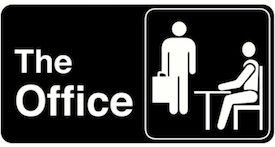
Those who were following the WSOP at the time �� the height of the televised poker "boom" �� got a laugh out of Kevin revealing he had won a $2,500 buy-in 2-7 NL draw event at the World Series of Poker a few years before. He even wears his bracelet at the table.
"So... yeah. I'm pretty good at poker," Kevin deadpans, just before getting stacked by Phyllis (Phyllis Lapin) who doesn't even realize she has a winning hand.
Incidentally, a few years back Chad Holloway spoke with Brian Baumgartner about his experience portraying Kevin on The Office and other topics, including his own poker experience.
As noted, besides allowing these supporting cast members to step forward a little more, the episode more importantly advances the relationship between Pam and Jim, with a poker hand between the two along the way providing another flirtatious moment between them bringing them closer to one another.
Everyone Has a Tell (Almost) on 30 Rock
Finally in 2006 also came the premiere of the sitcom 30 Rock starring Tina Fey as Liz Lemon, creator and writer of a comedy show on NBC. Alec Baldwin portrays Jack Donaghy, a VP of the network who oversees the show's production. It's a self-reflexive, "meta" situation that over its seven seasons enabled the show frequently to comment on various aspects of televised entertainment, including the network (NBC) on which it appeared.
In just the third episode of the series ("Blind Date"), poker serves as a convenient means by which to establish various members of the show's cast. The show includes two subplots, one involving the weekly poker night among the show's staff, the other a blind date Jack has arranged for Liz (with a woman, as Jack has mistaken her sexual orientation).
Among the topics Liz and her "date" discuss is Jack, which serves as one way to introduce his character to the audience further in an indirect way. Meanwhile the poker game also functions as a way for viewers to learn about Jack �� an arrogant, "alpha-male" who sees the game as a great way to assert his authority over the others.
"I enjoy poker," Jack says when learning of the regular game. "I'd be interested in seeing my new employees under that kind of pressure."
The game of five-card draw enables the fictional comedy's star Tracy Jordan (Tracy Morgan) to deliver his usual farcical lines, such as when he talks of being versed in poker variants like "Crazy Sevens," "Albuquerque Freak Out," and "One-Card Stud," or when he asks others "remind me what's better... a pair of black aces or a pair of red aces?"
Meanwhile Jack immediately ups the game's stakes from quarters to minimum bets of $25. "This is a man's game," he snarls, and the staff recoils.

They proceed to bet and lose their rent money, a wedding ring and other jewelry, and even Liz's Emmy to Jack, who with glee explains to the others why he's beating them �� he knows all of their tells.
"You see in poker as in business, the key to success is to determine your opponent's strength and his weaknesses," explains Jack. "Everyone has a tell, a weakness of character, that manifests itself physically." Tracy then challenges Jack to read him for his hand.
"Well, you have two of your cards backwards, actually," says Jack.
The na?ve and good-spirited NBC page Kenneth (Jack McBrayer) proves much harder for Jack to read, however, and as another character explains it is precisely because of Kenneth's simple-mindedness.
"Oh my God, he can't read Kenneth... he's a blank slate!"
Kenneth manages to win that night, and Jack �� humorously threatened by the least threatening character on the show �� arranges a more elaborate second poker night in order to win his money back.
"You are a puzzle," says Jack to Kenneth. "And I'm going to solve you. Yes I am."
Eventually Jack does beat Kenneth after the latter strangely calls an all-in with king-high. When asked why he stayed with such a terrible hand, Kenneth answers "Why? Because I believe life is for the living. I believe in taking risks and biting off more than you can chew. And also, people were yelling and I got confused about the rules."
It turns out he really is a blank slate.
Though played primarly for laughs, the poker game quickly serves in this early episode to establish the dynamic between Jack and his staff, as well as to introduce the various personality traits of the supporting cast. In other words, the viewer also gets to use the poker game to see and learn about characters "under that kind of pressure."
Conclusion
From this brief survey a couple of other important examples of TV comedies that used poker in more than just a casual way should be mentioned. One is The Odd Couple, the 1970-75 series based on the Neil Simon play and feature film in which poker was a prominent element in a story involving two mismatched male roommates. The other is the long-running M*A*S*H (1972-1983) set during the Korean War and featuring numerous poker-related episodes.
In both cases poker provides a more integral, ongoing context for characters' interactions and the development of larger themes. More often in TV sitcoms, though, a game of cards works as an occasional, efficient way to bring in conflicts and allow audiences to get to know unfamiliar characters �� as though inviting them to a seat at the table with the cast.
From the forthcoming "Poker & Pop Culture: Telling the Story of America's Favorite Card Game." Martin Harris teaches a course in "Poker in American Film and Culture" in the American Studies program at UNC-Charlotte.

